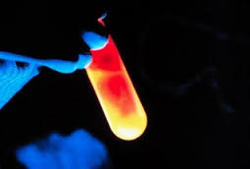Chemistry in Calculus!
 A reaction flask of capacity 1 liter, contains 4 moles of
, 7 moles of
and 9 moles of
at
. The reaction is governed by the following 3rd order chemical equation (unbalanced):
A reaction flask of capacity 1 liter, contains 4 moles of
, 7 moles of
and 9 moles of
at
. The reaction is governed by the following 3rd order chemical equation (unbalanced):
If the time taken for the formation of moles of is what is the value of
Details and Assumptions:
The rate constant is
If you think the reaction will terminate before the formation of the required amount of product, enter your answer as .
and , and are pairs of co-prime integers.
The answer is 72149.
This section requires Javascript.
You are seeing this because something didn't load right. We suggest you, (a) try
refreshing the page, (b) enabling javascript if it is disabled on your browser and,
finally, (c)
loading the
non-javascript version of this page
. We're sorry about the hassle.
0 solutions
No explanations have been posted yet. Check back later!